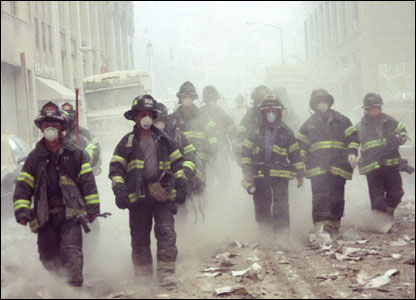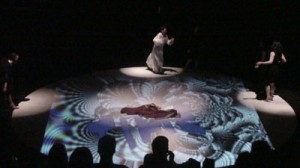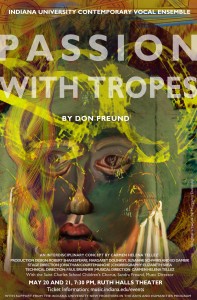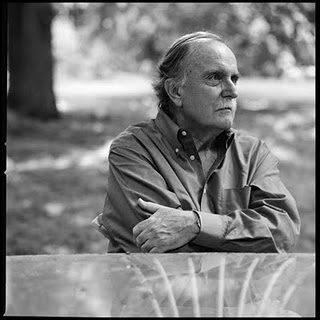
One of Chicago’s most notable chamber ensembles, Third Coast Percussion, joined forces on Tuesday evening with flutist Tim Munro (of eighth blackbird) to create an intriguing evening exploring music from the 20th and 21st centuries. While flute and percussion might not be an obvious combination, it worked extremely well with the assistance of some subtle amplification that did not detract or distract from the overall performance and actually assisted in giving what would have been an overly dry ambience some life.
The concert was well-programmed with a healthy balance between new works by Australian composer Anthony Pateras and Third Coast member Owen Clayton Condon against older works by George Crumb, John Fonville, and John Cage (the latter of which we’re going to be hearing a lot from over the next 18 months as we approach the centenary of his birth). Crumb’s An Idyll for the Misbegotten took good advantage of the balconies in the venue and allowed Munro to begin his performance behind the audience, wind his way through the tables and waiters before taking center stage and retracing his steps to conclude the piece with exquisite bird-like flutters where he began the work.
I’ve seen other concerts where two multi-movement works are interlaced, but none that worked quite so effectively as the combination of Fonville’s Music for Sarah for solo flute and Cage’s Quartet for percussion quartet; the extremely varied colors Munro was asked to extract from his instrument with polyphonic textures through singing-while-playing as well as playing without the head-joint shakuhachi-style made a resonant contrast against Cage’s simplistic, almost monochromatic instrumentation and non-melodic excursions that were brought to life through Third Coast’s intense performance. I have to point out David Skidmore’s accuracy during this piece, as the head of one of his mallets flew off near the end of the piece and popped yours truly square in the chest – nice shot, David!
One of two world premieres of the evening, Pateras’ work Lost Compass fit well in the Cage/Crumb mold that the first half of the concert had set; the combination of a meandering alto flute against four percussionists skittering across glassware and metals with knitting needles intentionally did not move forward with a purpose, but rather seemed to just exist as entities of themselves (an effect that was heightened with one’s eyes closed which helped to abstract the percussion sounds into one great and complex rattle). Cage’s Aria again strewed the percussionists around and within the audience to make improvisatory comments on what was the most memorable performance of the evening, with Tim Munro laying down his flute to belt, mutter, caterwaul, coo and stutter in five different languages (from memory, natch) all while wandering throughout the audience; it was a tour-de-force performance that would be a shame not to get recorded at some point. The evening concluded on the right note with Fractalia, Condon’s new percussion quartet for two marimba four-hands with each performer switching back and forth from the marimba to several toms; the work is both memorable and enjoyable while being not overly virtuosic – this piece could easily become a staple in the percussion quartet repertoire.
The concert took place in the Mayne Stage theatre on the North Side of Chicago, one of several “alternative venues” that are popping up all over the country and are unafraid to feature a wide array of styles and genres to a diverse audience. While this concert worked out really well in the venue for many reasons, there were a few times where the whispering of wait-staff and clinking of glasses made unwelcome comments through some of the more intimate moments – though I’m sure Mr. Cage would have approved.









 Among the highlights of Wednesday’s lunch and ceremony: composer John Corigliano spoke affectionately of the “human” side of ASCAP and its concert division’s work with classical composers. Fellow composer Bruce Adolphe spoke eloquently of BMI and its relationship with classical music. And Ara Guzelimian, dean and provost of Juilliard, introduced the Emersons with a brilliant historical review of recorded chamber music that was so eloquent it made me wish I hadn’t forgotten to bring my tape recorder.
Among the highlights of Wednesday’s lunch and ceremony: composer John Corigliano spoke affectionately of the “human” side of ASCAP and its concert division’s work with classical composers. Fellow composer Bruce Adolphe spoke eloquently of BMI and its relationship with classical music. And Ara Guzelimian, dean and provost of Juilliard, introduced the Emersons with a brilliant historical review of recorded chamber music that was so eloquent it made me wish I hadn’t forgotten to bring my tape recorder.
